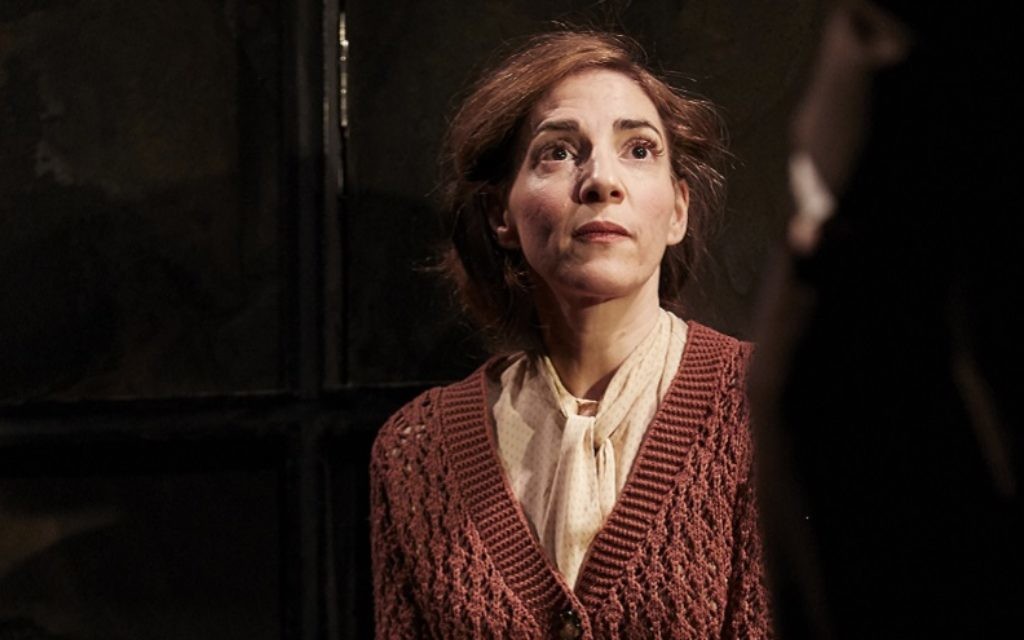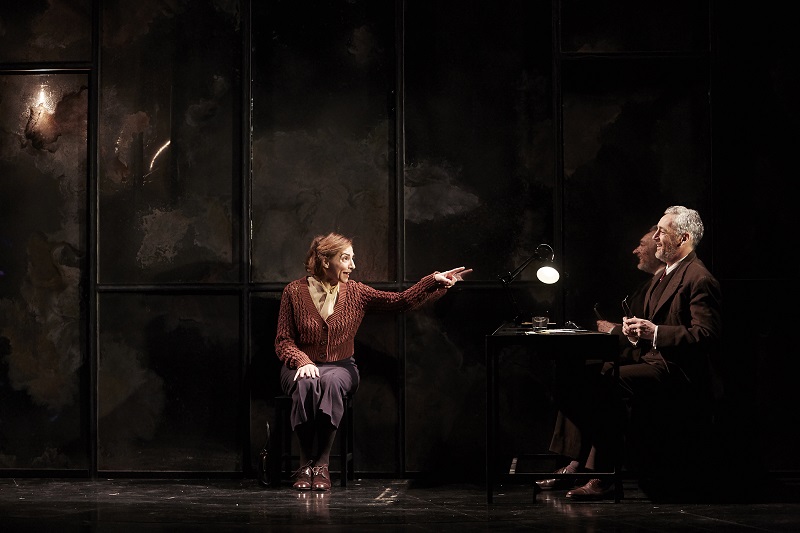Broken Glass might be set in 1930s New York, “but could be placed anywhere, at any time”
Francine Wolfisz speaks to Disobedience actress Clara Francis about her role in Arthur Miller’s play based on Kristallnacht

We may have said ‘never again’ after the Holocaust, but we live in such uncertain times it really could,” observes Clara Francis.
The seasoned actress, who stars alongside Rachel Weisz and Rachel McAdams in the hotly-anticipated drama, Disobedience, released later this year, is in a reflective mood as we speak about her latest role on stage.
She is currently treading the boards at Watford Palace Theatre in a revival performance of Arthur Miller’s play, Broken Glass, which coincides with the 80th anniversary year since the events that inspired it.
Get The Jewish News Daily Edition by email and never miss our top stories Free Sign Up
Set in New York in 1938, the play, directed by Richard Beecham, revolves around Phillip (Michael Matus) and Sylvia Gellburg (played by Amy Marston), who are living increasingly separate lives.
Phillip is obsessed with getting ahead in a real estate company, where he is the only Jew. Meanwhile, his wife becomes increasingly disturbed by news of Kristallnacht, the “night of broken glass”, in which the Nazis destroyed thousands of Jewish homes and businesses, smashing windows and burning synagogues in one night.
Despite verbalising her fears to her husband, Sylvia finds herself disregarded, including by her sister, Harriet (Francis) and becomes physically ill.
She suddenly becomes paralysed and in an attempt to find a cure, Phillip takes her to Dr Harry Hyman (Michael Higgs), whose “talking cure” has unexpected consequences.
For the 46-year-old actress, who trained at the Royal Central School of Speech and Drama, the role is all the more pertinent given that her own family was caught up in the terrifying events of Kristallnacht.
“My great-grandfather, Heinrich Stern, owned a large store in the centre of Offenbach, near Frankfurt. On Kristallnacht, the Nazis burnt his shop, broke all the windows and arrested my grandfather, Hans. He was sent to Buchenwald and, shortly after, Heinrich had a heart attack and died.
“Hans managed to eventually leave the camp, and Germany, but he didn’t leave until the very last minute before war broke out. He was very lucky.”
While Francis admits feeling “Kristallnacht is in my DNA”, for her latest role as Harriet, she feels “strangely detached” from the events of 9 November 1938, given her character’s indifferent attitude towards what is happening in Germany.
“Her mindset is completely opposite to her sister’s,” explains Francis. “Sylvia is consumed by everything she has read in the papers, but Harriet doesn’t feel that emotional connection to Germany.
“It was the Depression, and she, like many others, is worried about making a living and providing for her children. Why would she have time to worry about what was happening on the other side of the world?”
Sylvia’s husband Phillip shows a similar lack of concern.
“He’s a self-hating Jew, who wants to be seen as American, rather than Jewish-American. He feels ashamed about his otherness and is proud he’s the only Jewish person in the company where he works.
“He even encourages his son to join the army, because that’s not something Jewish people would do. He is fighting his Jewishness, whereas Sylvia is becoming increasingly connected.”

The Camden-based actress has previously starred in other productions of Miller’s work, including A View From The Bridge and The Crucible – and even met the prolific playwright during the early days of her career.
“While at drama school, I worked as a dresser for The Last Yankee at the Young Vic,” recalls Francis. “There, I was in the dressing room, scrabbling around to pick up the dirty laundry and in walked Arthur Miller. I think I got a bit tongue-tied, but he was very sweet and charismatic.”
During the time of writing Broken Glass in 1994, Miller was motivated to comment on the genocidal atrocities in Rwanda and Bosnia, a ghostly echo of mass murder 50 years after the Holocaust and promises of “never again”.
During an interview at the time, Miller said: “Suddenly we were witness to the unimaginable. Daily the media were broadcasting the killings and executions right into our homes.”
Broken Glass, which won the Olivier Award for best new play in 1995, is just as relevant more than two decades after it was first written, argues Francis.
“The themes are timeless. Look at what’s going on in Syria – terrible things are happening every day, but it’s not on the front page of the newspaper because people are not connecting. They don’t want to know.
“That’s really what the play questions, whether or not we should be engaged. Even though it’s set in 1930s New York, you could place it anywhere, at any time.”
Broken Glass runs at Watford Palace Theatre until 24 March. Details: watfordpalacetheatre.co.uk

Thank you for helping to make Jewish News the leading source of news and opinion for the UK Jewish community. Today we're asking for your invaluable help to continue putting our community first in everything we do.
For as little as £5 a month you can help sustain the vital work we do in celebrating and standing up for Jewish life in Britain.
Jewish News holds our community together and keeps us connected. Like a synagogue, it’s where people turn to feel part of something bigger. It also proudly shows the rest of Britain the vibrancy and rich culture of modern Jewish life.
You can make a quick and easy one-off or monthly contribution of £5, £10, £20 or any other sum you’re comfortable with.
100% of your donation will help us continue celebrating our community, in all its dynamic diversity...
Engaging
Being a community platform means so much more than producing a newspaper and website. One of our proudest roles is media partnering with our invaluable charities to amplify the outstanding work they do to help us all.
Celebrating
There’s no shortage of oys in the world but Jewish News takes every opportunity to celebrate the joys too, through projects like Night of Heroes, 40 Under 40 and other compelling countdowns that make the community kvell with pride.
Pioneering
In the first collaboration between media outlets from different faiths, Jewish News worked with British Muslim TV and Church Times to produce a list of young activists leading the way on interfaith understanding.
Campaigning
Royal Mail issued a stamp honouring Holocaust hero Sir Nicholas Winton after a Jewish News campaign attracted more than 100,000 backers. Jewish Newsalso produces special editions of the paper highlighting pressing issues including mental health and Holocaust remembrance.
Easy access
In an age when news is readily accessible, Jewish News provides high-quality content free online and offline, removing any financial barriers to connecting people.
Voice of our community to wider society
The Jewish News team regularly appears on TV, radio and on the pages of the national press to comment on stories about the Jewish community. Easy access to the paper on the streets of London also means Jewish News provides an invaluable window into the community for the country at large.
We hope you agree all this is worth preserving.
-
By Laurent Vaughan - Senior Associate (Bishop & Sewell Solicitors)
-
By Laurent Vaughan - Senior Associate (Bishop & Sewell Solicitors)
-
By Laurent Vaughan - Senior Associate (Bishop & Sewell Solicitors)
-
By Laurent Vaughan - Senior Associate (Bishop & Sewell Solicitors)





















